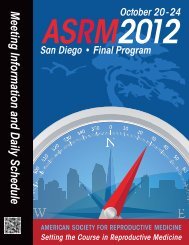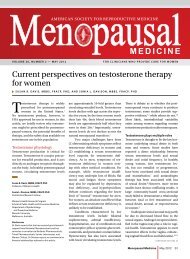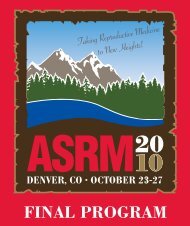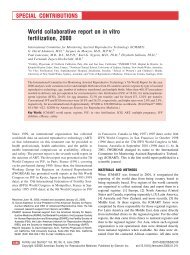scientific program • symposia - American Society for Reproductive ...
scientific program • symposia - American Society for Reproductive ...
scientific program • symposia - American Society for Reproductive ...
You also want an ePaper? Increase the reach of your titles
YUMPU automatically turns print PDFs into web optimized ePapers that Google loves.
SCIENTIFIC PROGRAM <strong>•</strong> SYMPOSIA<br />
Monday, October 17, 2011 4:15 pm – 6:15 pm<br />
Scientific Program Committee Symposium<br />
NUTRITION, DIET AND EPIGENETIC CHANGES PRIOR TO AND<br />
AFTER CONCEPTION<br />
Kelle H. Moley, M.D. (Chair)<br />
Washington University in St. Louis<br />
Carmen Sapienza, Ph.D.<br />
Fels Institute <strong>for</strong> Cancer Research<br />
Rebecca A. Simmons, M.D.<br />
University of Pennsylvania School of Medicine<br />
Needs Assessment and Description<br />
Maternal nutrition, diet and environmental exposure have<br />
long been known to have lasting effects on offspring and<br />
this phenomenon has been coined Developmental Origins<br />
of Health and Adult Diseases (DOHAD). Although the<br />
mechanisms responsible <strong>for</strong> this event are not entirely clear,<br />
dysregulation of the epigenome as well as alteration in<br />
genomic imprinting may play an important role and provide<br />
a putative explanation <strong>for</strong> how changes in gene expression<br />
as early as the gamete stage are heritably maintained<br />
through cell division in animals throughout life.<br />
Genomic imprinting is a process by which monoallelic<br />
expression of some specific genes in the diploid cells is<br />
dependent on whether the allele is transmitted from the<br />
sperm or from the oocyte. This epigenetic mechanism<br />
renders the parental genomes functionally unequal. To<br />
date, about 40 imprinted genes have been identified, some<br />
of which have been shown to be involved in embryonic<br />
development and growth, placental differentiation,<br />
suppression of tumorigenesis, behavior, and genetic<br />
disorders, respectively. Although little is known of the<br />
imprinting mechanisms, it is believed to be a multistep<br />
process. First, an imprinting signal <strong>for</strong> distinguishing the<br />
parental origin of the alleles in the embryo is constructed<br />
during gametogenesis of the parents. This process refers<br />
to a primary or gametic imprinting. Second, the imprinting<br />
signal on each gene is maintained after fertilization and<br />
leads to allele-specific gene expression until around the time<br />
of gastrulation. Third, this regulatory expression is sustained<br />
in the somatic cells throughout embryonic development,<br />
whereas the signals are erased in the germ cells.<br />
Animal models and human studies of dietary and<br />
nutritional changes prior to and during pregnancy have<br />
shown detectable changes in overall DNA methylation,<br />
and alterations in methylation state in specific regions<br />
of imprinted genes, such as the IGF2 receptor gene that<br />
controls normal embryonic development. These three<br />
presentations will highlight maternal dietary, environmental<br />
and related fetal epigenetic changes that can occur in<br />
response to changes in maternal diet and nutrition and that<br />
determine size and the development of disease states in the<br />
offspring.<br />
Room 224 E/F<br />
68<br />
Learning Objectives<br />
At the conclusion of this session, participants should be able<br />
to:<br />
1. Identify different mechanisms of dietary-induced<br />
epigenetic alterations in the diplotene oocyte and the<br />
developing fetus, as well as epigenetic determinants of<br />
birthweight.<br />
2. Recognize how preconception high fat feeding perturbs<br />
primary imprinting during oocyte growth and plays a<br />
critical role in both the expression and repression of<br />
maternal alleles during embryogenesis.<br />
3. Describe how maternally-induced fetal growth restriction<br />
leads to epigenetic changes resulting in offspring with<br />
type 2 diabetes.<br />
4. Explain how epigenetic signatures are linked to infant<br />
birthweight.<br />
ACGME COMPETENCY<br />
Medical Knowledge<br />
TEST QUESTION:<br />
Which one of the following best describes the effect of<br />
maternal nutrition and environmental exposure on outcome<br />
of offspring?<br />
A. No <strong>scientific</strong> evidence exists to strongly recommend<br />
weight loss and dietary changes prior to pregnancy in<br />
order to improve the lifelong health of the infant.<br />
B. Nutritional alterations during the oocyte growth phase<br />
can perturb DNA methylation and have lasting effects<br />
on offspring outcomes.<br />
C. Birthweight has no effect on lifelong health status in the<br />
child and this may be independent of traditional<br />
Mendelian genetics.








